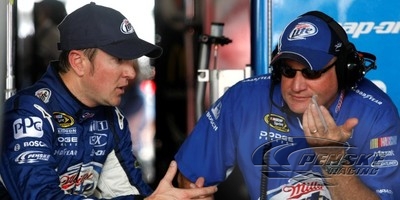Busch Believes Fuel Mileage Will Be Key at Michigan
August 11, 2009
"Can you say ‘fuel mileage race'?" chuckled Busch, currently fourth in the NASCAR Sprint Cup point standings, with a 275-point "Chase cushion" over 13th-place, younger brother, Kyle.
"Seriously, that's one track that you always come in there planning on it to have fuel mileage involved in the equation," said Busch, looking for his third career Sprint Cup Series victory at MIS in this weekend's race. "Mark (Martin) won there in June because of fuel mileage. Dale (Earnhardt) Jr. won the first race there last year due to fuel mileage.
"When you think back, especially considering all the recent races there, our win there two years ago (in the Tuesday, Aug. 21, 2007 event) was pretty much the exception to the rule," said Busch, who started fifth and finished eighth earlier this season at MIS. "We were able to win that race on sheer strength and performance of the car. We led half the laps and survived late cautions that took fuel mileage totally out of the equation. Even with a green-white-checkered finish, we still won by half a second over the second-place guy."
In the most recent race at MIS, the June 14 LifeLock 400, Mark Martin took the win on fuel mileage. Jimmie Johnson and Greg Biffle both had stronger cars down the stretch, but Johnson ran out of gas with two laps to go and Biffle's tank went dry with one circuit remaining. Martin led only the last lap, the one that counted most, in stretching his fuel.
"It's just the norm -- it's to be expected," said crew chief Pat Tryson. "I'll bet if you look back at the record book, you'll see that huge proportion of the Michigan races were won because of fuel mileage. The reason for that is simple - there are always so few cautions on that track. It's so wide and there is so much racing room, you don't see guys running into each other like you do on most of the other tracks."
Tryson's suggestions and reasoning certainly hold merit.
A quick look at the Michigan International Speedway record book shows that in 80 NASCAR premier series races to date (two races held every year since 1969, except in 1973 when the track hosted only one event), there has been only one race with a double-digit amount of cautions (10 in the August 2006 race). Furthermore, there have been three totally caution-free races (June 1973, August 1984 and June 1999). Three races have been completed with only one caution, eight with only two yellow flags and 10 with only three cautions slowing the pace.
The MIS statistics show that the majority (48 of 80 = 60 percent) of races held there have had five or fewer caution periods. The average cautions-per-race over the last 10 races is 6.6 (66 total yellow flags in the 10 races dating back to August 2004).
How do you prepare for the challenge that this weekend's CARFAX 400 presents?
"Our preparation begins long before we get to the race track," Tryson stated. "The engine department here at Penske Racing spends hours and hours getting ready for a race like Michigan. They can just about wear out an engine dyno (dynamometer) in getting ready for a race like this weekend's.
"They look at different reads on the metering block, looking to get the fuel curve just right with different bleeds," Tryson explained. "There really is a science to it all and we have some of the best in the business working for us. For a track like Michigan, the goal is to get all the mileage you can without giving up anything on the horsepower end. We hope we learned something from Monday's race at the Glen. That's a place where you're supposed to be able to afford to give up a little horsepower in order to get maximum fuel mileage. We came up a little bit short on both ends, but our guys are burning the midnight oil right now to get better overall.
"Then when we get to the track, we let Darin (Russel, team engine tuner) work his magic," Tryson said. "He does adjustments with the float level, the jets and so forth. Particularly with these new double-file restarts, you have to have the perfect balance of fuel mileage and horsepower.
"During the race, it's up to Kurt to conserve all the fuel he can," said Tryson. "Like there at Michigan in the June race, the last caution came out on Lap 150. With 50 laps to go, we pitted and looked to be about two laps shy of making the distance when we went back to green. We immediately told him what the situation was and he instantly went into the fuel-conservation mode. We were able to make it the rest of the way and pull another top-10 finish out of the day. Kurt deserved a ton of credit for doing what it took to squeeze all he could out of that last tank of fuel."
This weekend's Michigan International Speedway action gets under way on Friday with practice set from 12 noon till 1:30 p.m. (live on ESPN2). Qualifying for all 43 starting positions is set for Friday at 3:40 p.m. (live on ESPN2 & MRN Radio). Saturday's schedule calls for practice from 12:30 p.m. till 1:15 p.m. (live on Speed-TV) and from 1:50 p.m. till 2:50 p.m. (live on ESPN2). Sunday's CARFAX 400 (200 laps, 400 miles) on the 2.0-mile track in Michigan's scenic Irish Hills region is scheduled to get the green flag at approximately 2:00 p.m. Race No. 23 of 36 points-paying events on the 2009 NASCAR Sprint Cup schedule will feature live coverage by ESPN-TV and MRN Radio.

